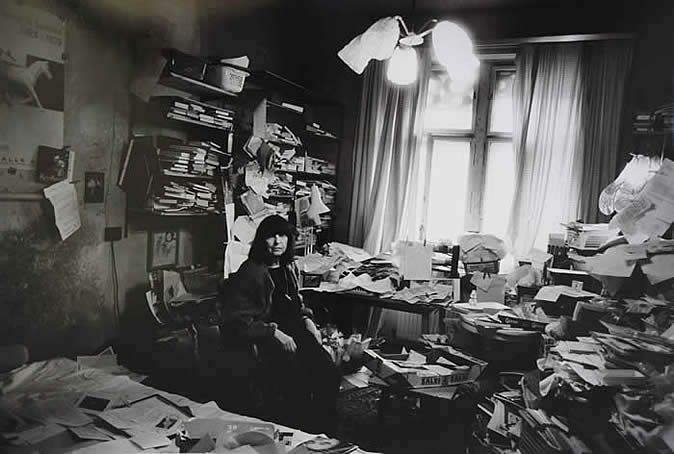INTO THE MORNING
if i craned my neck i saw them slowly begin to turn away, he said, a dream of course, the scatter of events, the scatter of events is amazing when seen from above, he said, the scatter of events, and how every new day we wash, dress, have washed, have dressed, this torture till we have finished washing, dressing, and how we can’t bear being talked to in the morning, he said, could this not go so far, he said, that we’d no longer want to set foot into the morning, he said, at least from my post of observation, he said.
(Friederike Mayröcker, with each clouded peak)
 i can’t stop thinking about this sentence. i can’t help but think this sentence is perfect. i was drawn to it because the day before i read it i had the same revelation about not wanting to set foot into the morning, about the torture of beginning, what it means to enter the day, and what is left behind when you enter. what is that moment? the one where you choose to step into the morning even though you know that the choice to begin is also a turning away from your dreams. the scatter of events. rhythm and repetition; ritual and repetition. the sentence lit up when i wrote it down. the scatter recurs in the sentence; the sentence accumulates and places you in time in all these different ways. not a straight path from one point to another, but a cluster of rivulets that flow in all directions. you are watching. you wait, have waited. you move between states of anticipation and retrospective contemplation, between the diurnal ritual of dressing and washing, the impending task before us (till we have), the moments after the dispersal, when the sediments have settled, when we have finished…have washed, have dressed. the appearance of simplicity. sentence is movement, an unfolding in time. yet while my eyes move from the first word to the last, something is happening in between. a temporal upheaval under the guise of linearity (the guise being the sentence itself), perhaps. a gesture toward a different way of entering the sentence.
i can’t stop thinking about this sentence. i can’t help but think this sentence is perfect. i was drawn to it because the day before i read it i had the same revelation about not wanting to set foot into the morning, about the torture of beginning, what it means to enter the day, and what is left behind when you enter. what is that moment? the one where you choose to step into the morning even though you know that the choice to begin is also a turning away from your dreams. the scatter of events. rhythm and repetition; ritual and repetition. the sentence lit up when i wrote it down. the scatter recurs in the sentence; the sentence accumulates and places you in time in all these different ways. not a straight path from one point to another, but a cluster of rivulets that flow in all directions. you are watching. you wait, have waited. you move between states of anticipation and retrospective contemplation, between the diurnal ritual of dressing and washing, the impending task before us (till we have), the moments after the dispersal, when the sediments have settled, when we have finished…have washed, have dressed. the appearance of simplicity. sentence is movement, an unfolding in time. yet while my eyes move from the first word to the last, something is happening in between. a temporal upheaval under the guise of linearity (the guise being the sentence itself), perhaps. a gesture toward a different way of entering the sentence.
Friederike Mayröcker and some scattered thoughts on writing spaces
Look at this clutter. Kind of glorious, no?
Is a messy mind the mark of a good writer or is that something dysfunctional people tell themselves in order to find comfort in the heaps of scattered pages? What is your writing space like? I don’t really have one, as I’m always on the move these days. I will say that it’s hard for me to sit at a desk. The closest I ever came to incorporating a desk into my erratic work routine was when I would go to IHOP in the middle of the night and stay until morning downing cup after cup of decaff coffee while scribbling in my notebook all bleary-eyed and delirious. But if it were socially sanctioned, I probably would have sat on the IHOP floor. Mostly I do everything while lying down in my invisible bed or sitting on the floor, perhaps because I am lazy…? I don’t believe in furniture. Probably am just undomesticated, feral. At a writing residency last year I had a normal room with a desk and a bed. And what did I do? Pulled the mattress onto the floor and probably didn’t sit at the desk once.
.
.
.
“I MUST FORGET EVERYTHING in order to finish this work, you have to get yourself in harness, no enmeshed, once you get involved in a writing project a writing diktat, there is no going back, or everything will be ruined, isn’t that right, maybe it’s getting your claw hooked into the robe of language, you attach yourself, you get snared, you get snagged in language in the MATERIAL in the TEXTURE, etc., and in the same way language seems to get hooked, attached, it hooks its claws into us the moment we acquiesce, so, we lead we guide each other, in equal measure . . .”
–Friederike Mayröcker, brütt, or The Sighing Gardens

